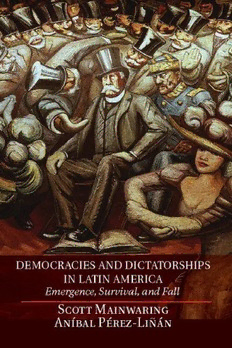
Democracies And Dictatorships In Latin America: Emergence, Survival, And Fall PDF
Preview Democracies And Dictatorships In Latin America: Emergence, Survival, And Fall
DemocraciesandDictatorshipsinLatinAmerica This book presents a new theory for why political regimes emerge and whytheysubsequentlysurviveorbreakdown.Itthenanalyzestheemer- gence,survival,andfallofdemocraciesanddictatorshipsinLatinAmerica since1900.ScottMainwaringandAníbalPérez-Liñánargueforatheo- retical approach situated between long-term structural and cultural explanations and short-term explanations that look at the decisions of specificleaders.Theyfocusonthepoliticalpreferencesofpowerfulactors– thedegreetowhichtheyembracedemocracyasanintrinsicallydesirable endandtheirpolicyradicalism–toexplainregimeoutcomes.Theyalso demonstratethattransnationalforcesandinfluencesarecrucialtounder- standregionalwavesofdemocratization.Basedonextensiveresearchinto thepoliticalhistoriesofLatinAmericancountries,thisbookoffersthefirst extended analysis of regime emergence, survival, and failure for all of LatinAmericaoveralongperiodoftime. ScottMainwaringistheEugeneandHelenConleyProfessorofPolitical ScienceattheUniversityofNotreDame.Hisresearchinterestsinclude democraticinstitutions,democratization,andpoliticalpartiesandparty systems.AmonghispreviousbooksareRethinkingPartySystemsinthe ThirdWaveofDemocratization:TheCaseofBrazil(1999),TheThird WaveofDemocratizationinLatinAmerica:AdvancesandSetbacks(co- edited, 2005), The Crisis of Democratic Representation in the Andes (co-edited, 2006), and Democratic Governance in Latin America (co- edited, 2010). Mainwaring is a member of the American Academy of Arts and Sciences. In 2007, he was listed as one of the 400 most cited politicalscientiststeachingintheUnitedStates. Aníbal Pérez-Liñán is an Associate Professor of Political Science and a member of the Center for Latin American Studies at the University of Pittsburgh.Hisresearchfocusesondemocratization,politicalinstitutions, andtheruleoflawinnewdemocracies.HeistheauthorofPresidential ImpeachmentandtheNewPoliticalInstabilityinLatinAmerica(2007) and has published articles in the Journal of Politics, World Politics, Comparative Political Studies, Comparative Politics, and Electoral Studies, among other journals. His research has been funded by the NationalScienceFoundation,theUnitedStatesAgencyforInternational Development,andtheInter-AmericanDevelopmentBank. Democracies and Dictatorships in Latin America Emergence, Survival, and Fall SCOTT MAINWARING UniversityofNotreDame ANÍBAL PÉREZ-LIÑÁN UniversityofPittsburgh 32AvenueoftheAmericas,NewYork,ny10013-2473,usa CambridgeUniversityPressispartoftheUniversityofCambridge. ItfurtherstheUniversity’smissionbydisseminatingknowledgeinthepursuitof education,learning,andresearchatthehighestinternationallevelsofexcellence. www.cambridge.org Informationonthistitle:www.cambridge.org/9780521152242 ©ScottMainwaringandAníbalPérez-Liñán2013 Thispublicationisincopyright.Subjecttostatutoryexception andtotheprovisionsofrelevantcollectivelicensingagreements, noreproductionofanypartmaytakeplacewithoutthewritten permissionofCambridgeUniversityPress. Firstpublished2013 PrintedintheUnitedStatesofAmerica AcatalogrecordforthispublicationisavailablefromtheBritishLibrary. LibraryofCongressCataloginginPublicationData Mainwaring,Scott,1954– DemocraciesanddictatorshipsinLatinAmerica:emergence,survival,andfall/ScottMainwaring, UniversityofNotreDame,SouthBend,Indiana;AníbalPérez-Liñán,UniversityofPittsburgh. pages cm isbn978-0-521-19001-5(hardback) 1. LatinAmerica–Politicsandgovernment–20th century. 2. LatinAmerica–Politics andgovernment–2stcentury. 3. Democracy–LatinAmerica–History–20th century. 4. Democracy–LatinAmerica–History–21stcentury. 5. Dictatorship–Latin America–History–20thcentury. 6. Dictatorship–LatinAmerica–History–21st century. 7. Authoritarianism–LatinAmerica–History–20thcentury. 8. Authoritarianism– LatinAmerica–History–21stcentury. 9. Politicalculture–LatinAmerica–History–20th century. 10. Politicalculture–LatinAmerica–History–21stcentury. I. Pérez-Liñán, AníbalS. II. Title. jl966.m353 2013 320.98–dc23 2013015859 isbn978-0-521-19001-5Hardback isbn978-0-521-15224-2Paperback Replicationdatasetsandancillarymaterialsforthisbookcanbefoundat: http://kellogg.nd.edu/democracies-materials.shtml CambridgeUniversityPresshasnoresponsibilityforthepersistenceoraccuracyof urlsforexternalorthird-partyInternetWebsitesreferredtointhispublication anddoesnotguaranteethatanycontentonsuchWebsitesis,orwillremain, accurateorappropriate. ForSueandMagdalena Withlove Contents ListofTables pageix ListofFigures xi Acknowledgments xiii 1. Introduction 1 2. ATheoryofRegimeSurvivalandFall 29 3. CompetitiveRegimesandAuthoritarianisminLatinAmerica 63 4. RegimeSurvivalandFall:AQuantitativeTest 93 5. FromMultipleBreakdownstoStabilizationofDemocracy: Argentina 124 6. FromPersistentAuthoritarianismtoaDurableDemocracy: ElSalvador 170 7. InternationalActors,InternationalInfluences,andRegime Outcomes 204 8. PoliticalRegimesaftertheThirdWave 242 9. RethinkingTheoriesofDemocratizationinLatinAmerica andBeyond 269 Appendix3.1. CodingRulesforPoliticalRegimes 297 Appendix3.2. CodingU.S.ForeignPolicytowardDemocracyin LatinAmerica 300 Appendix4.1. Long-RunEquilibriumfortheProportionof CompetitiveRegimes 303 vii viii Contents Appendix5.1. QualitativeComparativeAnalysis 304 Appendix6.1. CodingofSalvadoranActors,1979–2010 308 Bibliography 311 Index 345 Tables 3.1. PoliticalRegimesinLatinAmerica,1900–2010 page67 3.2. RulestoCodeU.S.ForeignPolicytowardPoliticalRegimes inLatinAmerica 86 3.3. ModelsofNormativeRegimePreferences 89 3.4. SimultaneousEquationsofPolicyRadicalismandRegime Preferences 92 4.1. PatternsofRegimeChange,byPeriod(1945–2005) 96 4.2. SurvivalModelsforAuthoritarianRegimes(Transitions), 1945–2005 104 4.3. AdditionalTransitionModels 108 4.4. ModelsforCompetitiveRegimes(Breakdowns), 1945–2005 109 4.5. AdditionalBreakdownModels 113 4.6. PredictedProbabilitiesofTransitionsandBreakdownsin FourScenarios 115 4.7. ObservedandPredictedRatesofRegimeChangebyPeriod (1945–2005) 118 5.1. HistoricalConditionsforArgentineCompetitiveRegimes, 1916–30 133 5.2. HistoricalConditionsforArgentineCompetitiveRegimes, 1946–76 147 5.3. HistoricalConditionsforArgentineCompetitiveRegimes, 1983–2010 157 5.4. AggregateConditionsforArgentineCompetitiveRegimes, 1916–2010 158 5.5. HistoricalConfigurationsLeadingtoBreakdowns: Argentina,1916–2010 166 ix
